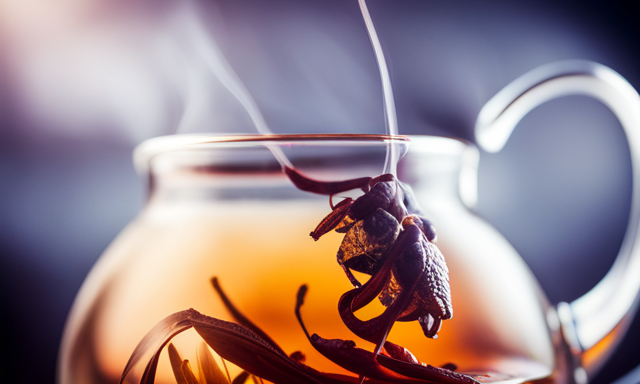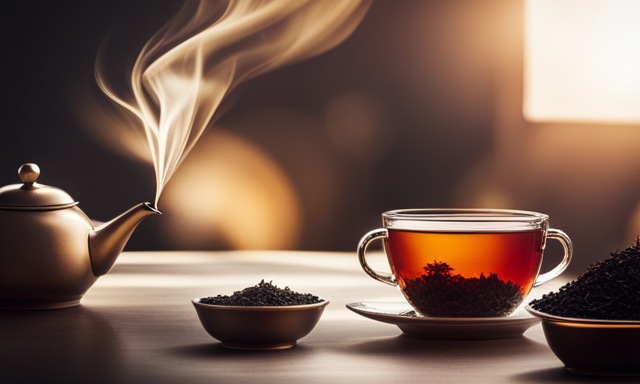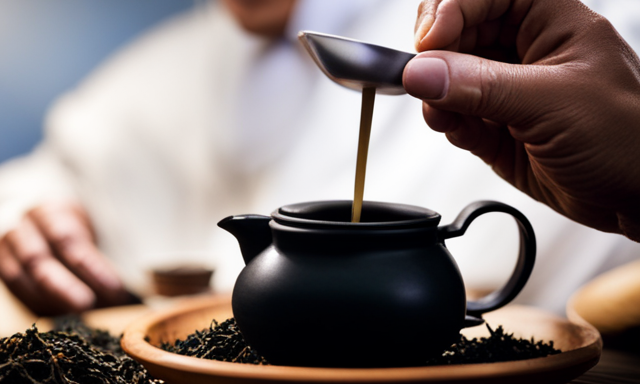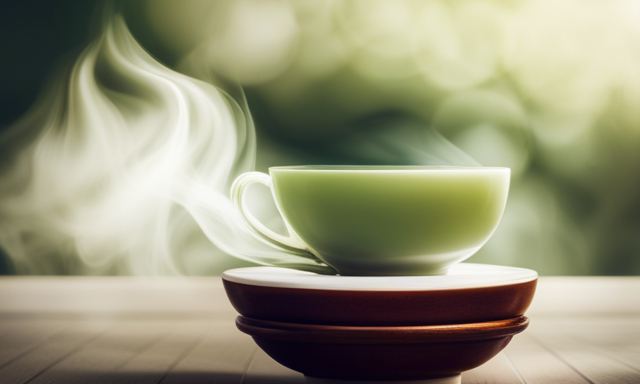As the saying goes, ‘A cup of tea solves everything.’ And when it comes to oolong tea, this couldn’t be more true. Let me take you on a journey to discover how this remarkable beverage works its magic.
Oolong tea, with its rich and complex flavor, is a true gem among teas. It has a fascinating history and a meticulous processing method that sets it apart from other varieties. But what really makes oolong tea special is its chemical composition, which is packed with antioxidants and beneficial compounds. These elements work synergistically to provide a range of health benefits, from improving digestion to regulating blood sugar levels.
Additionally, oolong tea has been found to promote healthy skin, making it a go-to choice for those seeking a natural glow. So, if you’re ready to unlock the secrets of oolong tea and incorporate it into your daily routine, join me on this enlightening journey.
Key Takeaways
- Oolong tea regulates blood sugar levels and lowers blood pressure.
- Oolong tea reduces inflammation and protects the skin from free radicals, reducing signs of aging.
- Oolong tea can be brewed using high-quality leaves and a teapot, steeped for 3-5 minutes for optimal flavor.
- Oolong tea can be incorporated into daily routines through recipes, skincare routines, and overall well-being enhancement.
The Origins and Processing of Oolong Tea
The origins and processing of oolong tea are essential to understanding its unique flavor and complexity. Exploring the cultural significance of oolong tea reveals its deep roots in Chinese tradition. With a history dating back over 400 years, oolong tea holds a special place in Chinese culture and is often associated with elegance and refinement.
Analyzing the various grades of oolong tea showcases the meticulous craftsmanship involved in its production. From the lightly oxidized, floral and fruity flavors of green oolong to the bolder, roasted notes of dark oolong, each grade offers a distinct taste experience. The leaves are carefully picked, withered, rolled, and then oxidized to varying degrees, resulting in a wide range of flavors and aromas.
Understanding the origins and processing of oolong tea sets the stage for exploring its unique flavor profile.
The Unique Flavor Profile of Oolong Tea
Imagine yourself walking through a lush orchard, where the delicate fragrance of blooming flowers dances in the air, and the taste of a golden sunset caresses your palate. Oolong tea offers a unique taste that transports you to this sensory experience.
Its flavor profile is a harmonious balance between the floral and fruity notes of green tea and the rich, roasted undertones of black tea. This results in a tea that is both refreshing and complex, with a smooth mouthfeel and a lingering sweetness.
The first sip reveals a burst of flavors, from the fresh grassiness of spring to the warm, nutty nuances of autumn. Each cup is a journey through seasons, a symphony of taste that captivates the senses.
Understanding the chemical composition of oolong tea allows us to delve deeper into its fascinating flavors and benefits.
Understanding the Chemical Composition of Oolong Tea
Take a moment to appreciate the intricate dance of flavors in your cup as you explore the captivating chemistry that brings oolong tea to life.
Oolong tea is a complex beverage that undergoes various chemical reactions during the brewing process, which contribute to its unique taste and aroma. The key chemical reactions that occur include oxidation, enzymatic browning, and polymerization.
Oxidation is responsible for the transformation of the tea leaves’ natural compounds, resulting in the formation of new flavors and aromas. Enzymatic browning, on the other hand, occurs when the enzymes in the tea leaves interact with oxygen, leading to the development of rich and robust flavors.
Lastly, polymerization is a process where the tea’s polyphenols combine to form larger molecules, enhancing the tea’s body and mouthfeel.
Understanding these chemical reactions and how they are influenced by different brewing techniques is crucial in creating the perfect cup of oolong tea.
As we delve into the potential health benefits of oolong tea, let’s first explore its fascinating chemistry.
The Potential Health Benefits of Oolong Tea
Oolong tea offers a range of potential health benefits that make it a great addition to my daily routine. Not only can it help boost metabolism and aid in weight management, but it also has the potential to improve heart health by reducing cholesterol levels.
Additionally, the presence of caffeine and other compounds in oolong tea can enhance brain function and promote mental alertness.
Boosting Metabolism and Weight Management
Elevate your weight management journey by discovering how oolong tea can naturally enhance your metabolism. Here are five ways oolong tea can help boost your metabolism and aid in weight management:
-
Boosting Energy Levels: Oolong tea contains caffeine, which can provide a natural energy boost and help you stay active throughout the day.
-
Increasing Fat Burning: The polyphenols found in oolong tea have been shown to increase fat oxidation, helping your body burn more calories.
-
Managing Appetite: Oolong tea can help regulate hunger hormones, reducing cravings and promoting a feeling of fullness.
-
Improving Digestion: The antioxidants in oolong tea can aid in digestion, preventing bloating and promoting a healthy gut.
-
Enhancing Thermogenesis: Oolong tea has been found to increase thermogenesis, the process by which your body generates heat and burns calories.
By incorporating oolong tea into your daily routine, you can support your weight management goals naturally.
Transitioning into the subsequent section on improving heart health, let’s explore the benefits of oolong tea for your cardiovascular well-being.
Improving Heart Health
By incorporating oolong tea into your daily routine, you can naturally improve your heart health and support cardiovascular well-being.
Oolong tea has been found to have a positive impact on blood circulation, helping to improve the flow of blood throughout the body. This can contribute to a healthier heart and reduce the risk of cardiovascular issues.
Additionally, studies have shown that oolong tea can help in reducing cholesterol levels, specifically LDL or ‘bad’ cholesterol. High levels of LDL cholesterol can lead to plaque buildup in the arteries, increasing the risk of heart disease. Oolong tea can help to lower these levels, promoting a healthier heart.
With improved heart health, you can enhance your overall well-being and pave the way for the subsequent section about enhancing brain function.
Enhancing Brain Function
Boost your brain power and unlock your cognitive potential by incorporating oolong tea into your daily routine. Here are three ways in which oolong tea can enhance your brain function:
-
Enhancing Focus: Oolong tea contains caffeine and theanine, which work together to improve alertness and concentration. This can help you stay focused and productive throughout the day.
-
Cognitive Benefits: The antioxidants found in oolong tea, such as polyphenols, have been shown to protect brain cells from damage and improve overall brain health. Regular consumption of oolong tea may even reduce the risk of neurodegenerative diseases like Alzheimer’s and Parkinson’s.
-
Mental Clarity: Oolong tea has been found to increase alpha brain wave activity, which is associated with a state of relaxed alertness and mental clarity. This can help improve cognitive performance and creativity.
By enhancing focus and providing cognitive benefits, oolong tea can be a valuable addition to your daily routine. Now let’s explore the role of oolong tea in digestive health.
The Role of Oolong Tea in Digestive Health
Oolong tea helps improve digestive health by soothing the stomach and aiding in the digestion process. It has been found to have a positive impact on gut bacteria, promoting the growth of beneficial bacteria while inhibiting the growth of harmful ones. This balance of gut bacteria is crucial for maintaining a healthy digestive system.
Additionally, oolong tea plays a role in reducing inflammation in the gut. The antioxidants present in oolong tea help fight off inflammation and prevent damage to the digestive organs. By reducing inflammation, oolong tea can alleviate symptoms such as bloating, cramping, and indigestion.
Furthermore, studies have shown that oolong tea may help regulate blood sugar levels, making it a potential aid for those with diabetes. Exploring the effects of oolong tea on blood sugar levels will further our understanding of its potential benefits for digestive health.
Exploring the Effects of Oolong Tea on Blood Sugar Levels
Imagine yourself sipping on a warm cup of this flavorful brew, feeling the subtle sweetness dance on your taste buds as you delve into the fascinating effects oolong tea has on regulating blood sugar levels.
Exploring the effects of oolong tea on blood pressure, studies have shown that regular consumption of this tea can help lower blood pressure levels. Oolong tea contains polyphenols, which are powerful antioxidants that have been found to improve insulin sensitivity and reduce insulin resistance, ultimately leading to better blood sugar control.
Additionally, researchers are investigating the role of oolong tea in managing cholesterol levels. Some studies suggest that oolong tea may help reduce LDL cholesterol levels, also known as the ‘bad’ cholesterol.
These findings highlight the potential benefits of incorporating oolong tea into your daily routine.
As we transition into the subsequent section about the impact of oolong tea on skin health, it is evident that this tea offers numerous advantages beyond its delightful taste.
The Impact of Oolong Tea on Skin Health
One interesting statistic reveals that regular consumption of oolong tea has been associated with a 30% decrease in the prevalence of skin blemishes and acne. This remarkable impact on skin health is attributed to the tea’s unique properties. Here’s a list of four ways oolong tea can benefit your skin:
-
Reducing inflammation: Oolong tea contains polyphenols that’ve been shown to have anti-inflammatory effects, helping to calm irritated skin and reduce redness.
-
Fighting signs of aging: The antioxidants in oolong tea help protect the skin from free radicals, which can cause premature aging. Regular consumption may help reduce the appearance of wrinkles and fine lines.
-
Improving skin tone: Oolong tea has been found to promote a healthy complexion by improving blood flow and increasing the delivery of nutrients to the skin cells.
-
Hydrating the skin: Staying hydrated is crucial for maintaining skin health, and oolong tea can contribute to your daily fluid intake.
With its impressive impact on aging and reducing inflammation, oolong tea offers a natural way to improve your skin’s health. So, let’s now delve into how to brew the perfect cup of oolong tea.
How to Brew the Perfect Cup of Oolong Tea
When it comes to enjoying the many benefits of oolong tea, it’s important to know how to brew the perfect cup. Brewing techniques can greatly impact the flavor profiles and overall experience of this unique tea.
To begin, start by selecting high-quality oolong tea leaves and a teapot or infuser. Bring fresh, filtered water to a boil and let it cool slightly before pouring it over the leaves. Let the tea steep for 3-5 minutes, or longer if you prefer a stronger flavor.
As you wait, take in the aroma and anticipation of the rich, complex flavors that oolong tea has to offer. Once the steeping time is complete, strain the tea into a cup and savor every sip.
Now that you know how to brew the perfect cup of oolong tea, let’s explore how to incorporate it into your daily routine seamlessly.
Incorporating Oolong Tea into Your Daily Routine
Start your day off right by incorporating the rich and complex flavors of oolong tea seamlessly into your daily routine. Oolong tea is not only a delicious beverage, but it can also be used in a variety of ways to enhance your overall well-being. One way to incorporate oolong tea into your routine is by creating oolong tea infused recipes. This can be as simple as adding a splash of brewed oolong tea to your morning smoothie or using it as a base for a flavorful marinade. Additionally, oolong tea can also be incorporated into your skincare routine. Its antioxidant-rich properties can help improve the appearance of your skin, leaving it looking refreshed and rejuvenated. So why not explore the many possibilities of oolong tea and make it a part of your daily routine?
| Recipes | Skincare Routine |
|---|---|
| Oolong Tea Smoothie | Oolong Tea Face Mask |
| Oolong Tea Marinade | Oolong Tea Toner |
| Oolong Tea Salad Dressing | Oolong Tea Bath Soak |
| Oolong Tea Ice Cream | Oolong Tea Facial Steam |
Frequently Asked Questions
Is oolong tea suitable for people with diabetes?
Oolong tea can be suitable for people with diabetes as it may help in managing blood sugar levels. It has potential benefits due to its active compounds that can improve insulin sensitivity and regulate glucose metabolism.
Does oolong tea contain caffeine?
Yes, oolong tea contains caffeine, which can provide a gentle energy boost. Along with its health benefits like improved heart health and reduced inflammation, it can be brewed by steeping the leaves in hot water for 3-5 minutes.
Can oolong tea help with weight loss?
Oolong tea can potentially aid in weight loss as it has been shown to increase metabolism and assist in appetite control. It can help boost calorie burning and reduce cravings, making it a beneficial addition to a weight loss routine.
What is the recommended daily intake of oolong tea?
The recommended daily intake of oolong tea varies, but it is generally recommended to consume 2-3 cups per day to maximize its health benefits. Different brewing techniques can also affect the taste and benefits of the tea.
Does oolong tea have any side effects?
Oolong tea may have some side effects. It is important to be aware of potential risks and take necessary precautions. These can include digestive issues, caffeine sensitivity, and interactions with certain medications.
Conclusion
In conclusion, oolong tea is a remarkable beverage that offers a myriad of benefits for our overall well-being. Its origins and unique processing result in a flavor profile that is both complex and satisfying.
With its rich chemical composition, oolong tea has the potential to support our digestive health and regulate blood sugar levels. Additionally, its antioxidants can promote healthy skin.
By incorporating oolong tea into our daily routine and brewing it with care, we can enjoy a truly perfect cup that contributes to our health and happiness.










